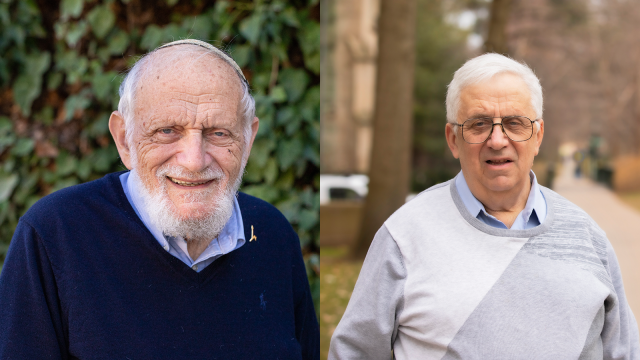Scientists Hillel Furstenberg and Gregory Margulis have won this year’s Abel Prize, which is considered one of the highest honours in mathematics.
The scientists won the prize “for pioneering the use of methods from probability and dynamics in group theory, number theory and combinatorics,” according to the prize citation. They will split an approximately $US834,000 ($1,391,482) sum, awarded by the Norwegian Academy of Science and Letters.
“The works of Furstenberg and Margulis have demonstrated the effectiveness of crossing boundaries between separate mathematical disciplines and brought down the traditional wall between pure and applied mathematics,” Hans Munthe-Kaas, chair of the Abel Prize committee, said in a press release.
Furstenberg was born in Germany in 1935 to a Jewish family who fled to the United States just before the start of WWII. He was raised in an orthodox neighbourhood in New York City and received his bachelor’s and master’s degrees from Yeshiva University before getting his Ph.D at Princeton in 1960. He worked as an assistant professor and then full professor at the University of Minnesota but left in 1965 to work at the Hebrew University of Jerusalem until 2003.
Meanwhile, Margulis, born in Moscow in 1946, received his Ph.D from Moscow State University in 1970 and won the famous Fields Medal in 1978—though the Soviet government refused to let him travel to receive it. He worked at various institutions in Europe through the 1980s and has been based at Yale University since 1991.
[referenced url=” thumb=” title=” excerpt=”]
The researchers’ work demonstrates the use of randomness and probability in order to understand topics spanning the various fields of mathematics. This research builds on tools from ergodic theory, the study of systems that visit all of their possible states over time, whose evolution is analysed using probability theory. Furstenberg devised disjointness in these systems—a concept similar to coprimality, where two numbers are called coprimes if the only divisor they share is 1—which found applications across geometry, engineering, and number theory.
Furstenberg also used ergodic theory to provide a new way to prove Szemerédi’s theorem, which relates to series of numbers in which the difference between consecutive terms is constant (like 1,3,5,7,9…), again providing a way to understand one field of mathematics in the terms of another—in this case, arithmetic combinatorics understood through ergodic theory.
Margulis wrote theorems classifying and analysing objects in abstract algebra called latices of semi-simple groups. His techniques also relied on the use of methods from probability theory. Furstenberg and Margulis did not collaborate directly, instead relying on each others’ tools to do their research.
Together, the two scientists devised mathematical devices that have created order from chaos—using randomness to produce theorems and tools in non-probabilistic fields of mathematics. These tools are used today in the study of graph theory, computer science, abstract algebra, and other disparate mathematical fields.
The prize came as a total surprise to Furstenberg, according to an interview. “I had known about the prestige of the Abel Prize and knew the list of former laureates of the Abel Prize, of whom I have a very high regard,” he said.
“I simply felt that these were people in a certain league and I was not in that league.”
Meanwhile, Margulis said he considered the award a great honour but pointed out that many other people were also deserving of the prize, given how any scientist’s research must build on the work of others.
The Abel Prize ceremony had been scheduled for May 19 but is postponed due to the ongoing covid-19 pandemic.
